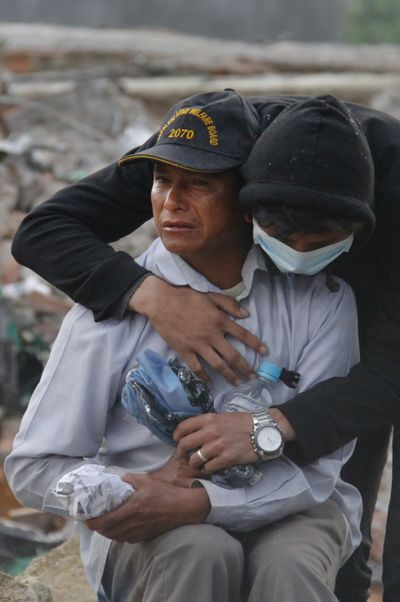Remote Nepal villages beginning to receive aid
Small protest reflects frustrations, fears

KATHMANDU, Nepal – The first supplies of food aid began reaching remote, earthquake-shattered mountain villages in Nepal, while thousands clamored to board buses out of Kathmandu, either to check on rural relatives or for fear of spending yet another night in the damaged capital.
Frustration over the slow delivery of humanitarian aid boiled over in a protest in the city, with about 200 people facing off with police and blocking traffic.
The protest was comparatively small and no demonstrators were detained. But it reflected growing anger over bottlenecks that delayed much-needed relief days after the powerful earthquake that killed more than 5,500 people, injured twice that many and left tens of thousands homeless. Police, meanwhile, arrested dozens of people on suspicion of looting or causing panic by spreading rumors of another big quake.
Helicopters finally brought food, temporary shelter and other aid to hamlets north of Kathmandu in the mountainous Gorkha District near the epicenter of Saturday’s 7.8-magnitude quake. Entire clusters of homes there were reduced to piles of stone and splintered wood.
While the death toll in the village of Gumda was low – only five people were killed and 20 were injured among 1,300 residents – most had lost their homes and desperately needed temporary shelter, along with the 90-pound sacks of rice that were delivered Wednesday. Adding to residents’ misery was the rain that has fallen periodically since the quake and hampered helicopter aid flights.
The U.N. World Food Program warned that it will take time for food and other supplies to reach more remote communities that have been cut off by landslides.
“More helicopters, more personnel and certainly more relief supplies, including medical teams, shelter, tents, water and sanitation and food, are obviously needed,” said the program’s Geoff Pinnock, who was coordinating the flights.
With more than 8 million Nepalese affected by the earthquake, including 1.4 million who need immediate food assistance, Pinnock said the effort would continue for months.
President Barack Obama called Prime Minister Sushil Koirala and discussed U.S. military and civilian efforts already underway to help Nepal, the White House said.